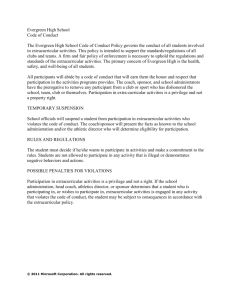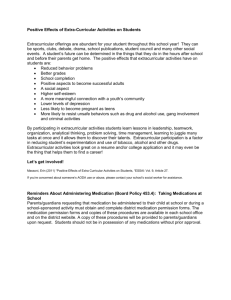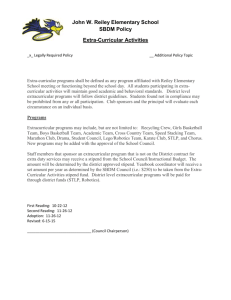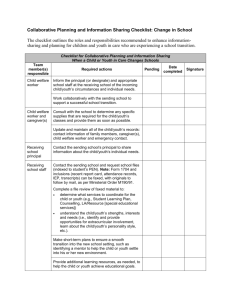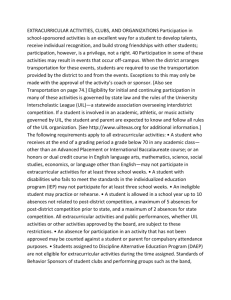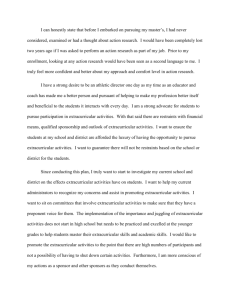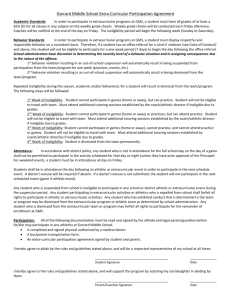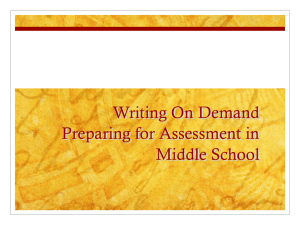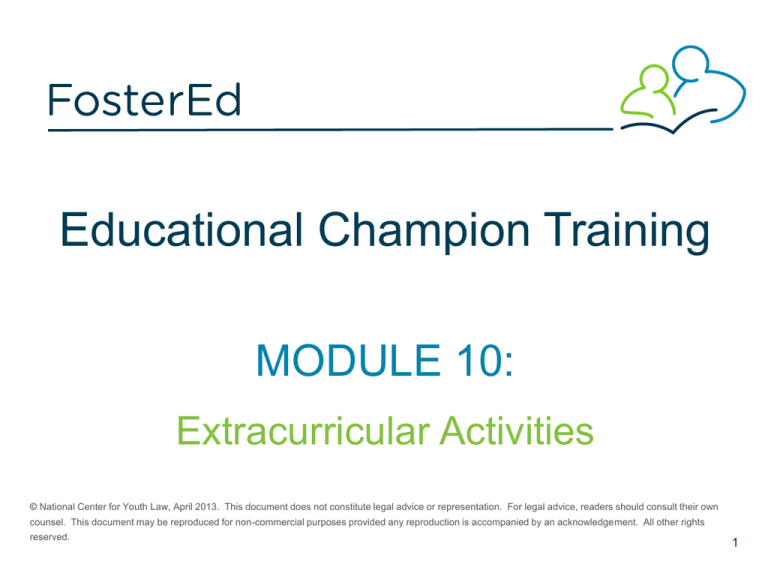
Educational Champion Training
MODULE 10:
Extracurricular Activities
© National Center for Youth Law, April 2013. This document does not constitute legal advice or representation. For legal advice, readers should consult their own
counsel. This document may be reproduced for non-commercial purposes provided any reproduction is accompanied by an acknowledgement. All other rights
reserved.
1
Why Focus on Extracurricular Activities?
Extracurricular activities give children an opportunity to practice academic skills in a
real-world context.
Participation in extracurricular activities increases self-esteem and sense of
belonging – these reduce the likelihood of academic failure and school dropout.
Participation in extracurricular activities helps with consistent attendance, academic
achievement, and aspirations for continuing education beyond high school.
Foster youth have the right to participate in extracurricular activities, just like any
other student!
APRIL 2013
2
Think about whether the child could benefit from
participating in some after-school activities.
Make a list of any hobbies or interests the child has, and of activities
you think the child might like to participate in.
Here are some examples of extracurricular activities:
Sports teams
Art programs
School newspaper
School band
Special interest clubs, like photography club or the Model United
Nations club
APRIL 2013
3
Other ways to find extracurricular activities.
Talk to other members in the community to find activities available
in your county.
Ask the office staff at the school for information activities that are
available at the school site.
Ask the district’s foster youth education liaison.
Check with the child’s CASA advocate or social worker for more
ideas or recommendations.
APRIL 2013
4
Talk to the child about getting involved in
one or more activities.
Ask the child if s/he is interested in participating in some afterschool activities.
Be respectful of the child’s feelings.
Encourage the child to participate in something s/he enjoys but do
not pressure or force the child to participate.
APRIL 2013
5
Talk to the child about how things are going.
Once the child to participate in an activity, regularly ask the
child about how things are going.
For example, you could ask:
What did you do at practice today?
What project is your school club working on?
Did you learn anything new in (activity) today?
APRIL 2013
6
Be prepared to support the child’s
participation in the activity.
If the child decides to participate in a program, make sure you have a
plan to get the child to/ from the activity regularly.
Know that some activities may involve small expenses. Talk to the
social worker for help.
The timing of the activity may change the child’s after-school routine at
home. Talk to the child about creating a schedule. Make sure there is
time to do homework, eat dinner, & get enough sleep.
If you are not the child’s caregiver, check with the social worker on the
best way for you to communicate and coordinate with the caregiver.
APRIL 2013
7
Think about whether the child could also
benefit from a summer activity or program.
Check with the school district foster youth education liaison and other
school staff, the child’s social worker, or the child’s CASA for ideas
and recommendations.
APRIL 2013
8
Consider getting input from other
adults involved in the child’s life.
Especially if the child does not live with you, you may want to ask other
adults in the child’s life for help recommending and seeking out
appropriate extracurricular activities for the child.
EXAMPLE:
If the child does not live with you, you may want to ask the caregiver for
insight on the child’s interests and hobbies. Because the caregiver has
daily contact with the child, both the caregiver and the child will benefit
when you involve the caregiver in connecting the child with extracurricular
activities. Check with the social worker about the best way for you to
communicate and coordinate with the caregiver.
APRIL 2013
9
My Goals:
What I will do:
How often I will do this:
__________________
___________________
__________________
___________________
__________________
___________________
__________________
___________________
__________________
___________________
__________________
___________________
APRIL 2013
10
Resources.
This PowerPoint, Tip Sheets, Mentoring Modules, and supporting
materials can be found at: www.foster-ed.org.
If you have questions about the materials, please contact:
info@fostered.org
Other Resources:
Extracurricular Participation and Student Engagement, written by
the National Center for Education Statistics and available at
http://nces.ed.gov
APRIL 2013
11

